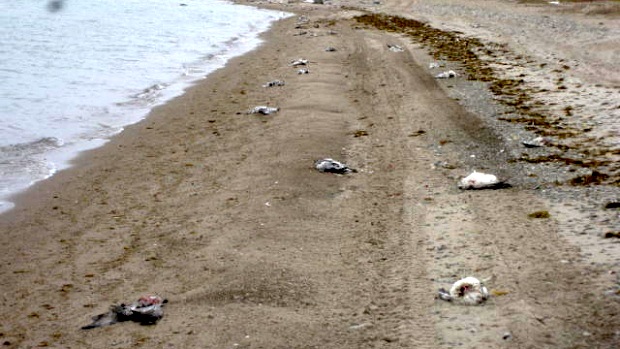A Western Nunavut goose die-off was due to ‘natural causes,’ autopsies show
Natural causes led to the death of more than 1,000 geese on Long Point beach outside Cambridge Bay this past August, a pathologist’s report has found.
“It appears likely that these young geese were not in good enough condition to complete the crossing from Victoria Island to the mainland under those conditions. Malnutrition, in addition to drinking salt water from the marine environment, likely contributed to the deaths,” said Jim Leafloor, a Winnipeg-based goose expert with Environment and Climate Change Canada, in an emailed statement.

Pathologists from the University of Calgary’s faculty of veterinary medicine performed autopsies on the birds for Environment and Climate Change Canada.
The dead birds—more numerous than the 400 reported at the time—included mostly juvenile snow geese as well as some greater white-fronted geese and cackling geese, said a pathologist’s report obtained by Nunatsiaq News.
Three carcasses of one snow goose and two cackling geese were collected and sent to the University of Calgary for testing.
There, pathologists conducted a wide range of tests to evaluate likely causes of death.
They found the three birds were in poor body condition, based on “reduced pectoral muscles and reduced to absent fat.”
Toxic levels of salt were detected in the brain of the one bird that could be tested for it—perhaps due to salt intoxication from drinking sea water or indirectly related to dehydration.
“Malnutrition and poor body condition can result in dehydration, which would have made the birds more likely to drink salt water and suffer from salt intoxication,” the report said.
“Geese have salt glands that allow them to drink salt water but those are not fully developed in juvenile birds, making them more susceptible to intoxication from drinking salt water.”
The dehydration and malnutrition could have resulted from bad weather that week, which included strong winds and fog during the week of the die-off.
The pathologists tested for, then dismissed, other potential causes of mortality, such avian influenza, botulism, avian cholera, Newcastle disease, duck viral enteritis and lead or other heavy metal intoxication.